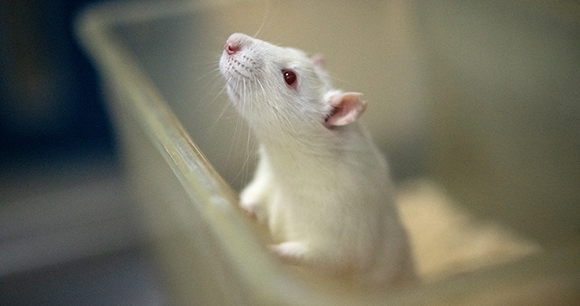
Washington, DC—Last month, both the National Institutes of Health and the US Food and Drug Administration announced plans to phase out the use of animals in scientific research. The Animal Welfare Institute (AWI) strongly supports transitioning away from experiments on animals to cutting-edge non-animal models, but proper planning is essential to ensure the best outcomes for animals and science.
Moreover, AWI is deeply concerned about the Trump administration’s recent moves to gut funding for scientific research more broadly.
“Drastic, sudden, and arbitrary cuts to scientific research, coupled with federal workforce layoffs, are harmful to animals, people, and science,” said Dr. Joanna Makowska, director of AWI’s Animals in Laboratories Program. “In the short term, broad cuts to research on animals without allocating funding for rehoming eligible animals used in experimentation will result in compromised welfare or mass euthanasia for the millions of animals currently housed in laboratories. In the long run, research using animals will be reduced, but so will research on public health, medicine, and species and ecosystem conservation, which will affect an untold number of people and animals. This administration is taking a wrecking ball to science.”
Earlier this week, the NIH announced a new initiative to “prioritize human-based research technologies” and “reduce [the] use of animals in NIH-funded research.” While the agency provided no comprehensive roadmap for achieving its goals, it did announce plans for a new Office of Research Innovation, Validation, and Application to coordinate agencywide efforts and expand infrastructure for non-animal research approaches.
This initiative will face an uphill battle and additional funding for non-animal alternatives will be critical. Nevertheless, the administration appears to be working at cross purposes. Its recent decision to freeze more than $2.2 billion in federal funds to Harvard University, for instance, also affects Harvard’s Wyss Institute, which has pioneered the most promising non-animal research alternative: organ-on-a-chip technology.
Most NIH-funded studies involve “basic” research, studies of an exploratory nature meant to advance general scientific knowledge or uncover the progression of disease, among other objectives. Unfortunately, non-animal models are still in the early phases of development for this type of research.
Animal testing, by contrast, involves testing drugs or products to ensure their safety before they are used on humans. Non-animal methodologies are much more readily able to replace animals for regulatory testing requirements, such as those overseen by the FDA. On April 10, the FDA announced detailed plans to phase out its animal testing requirement for certain drug safety studies.
The FDA’s roadmap, unlike the scant information provided by the NIH, outlines a six-prong approach to reduce toxicity testing in animals over the next three years and details six scientific and technical steps for the agency to adopt non-animal research models. AWI applauds the attention to detail evident in the FDA’s announcement and will closely follow how these plans move forward, given mass funding cuts at the agency.
Importantly, neither the NIH nor the FDA have announced plans to retire existing laboratory animals. AWI urges the administration to allocate sufficient resources to guarantee humane outcomes for these animals while developing and advancing alternatives to their use.
Marjorie Fishman, Animal Welfare Institute
[email protected], (202) 446-2128
The Animal Welfare Institute (awionline.org) is a nonprofit charitable organization founded in 1951 and dedicated to alleviating animal suffering caused by people. We seek to improve the welfare of animals everywhere: in agriculture, in commerce, in our homes and communities, in research, and in the wild. Follow us on Facebook, Instagram, Threads, Bluesky, and LinkedIn for updates and other important animal protection news.